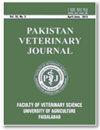Immunohistochemical and Histological Features of a Spontaneous Leydig Cell Tumour in a Rat
IF 5.4
3区 农林科学
Q1 VETERINARY SCIENCES
引用次数: 2
Abstract
Received: Revised: Accepted: Published online: December 30, 2018 February 20, 2019 April 16, 2019 May 25, 2019 Neoplastic testicular lesions are diagnosed increasingly frequently in dogs and humans. In rats, spontaneous testicular tumours, particularly Leydig cell tumours, are very rare. The aim of the study was to carry out a histological and immunohistochemical analysis of a Leydig cell tumour in a rat as well as to present the similarities and differences in the expression of the proteins used to diagnose this type of tumour in dogs and men. Following the histopathological and immunohistochemical analysis (including antibodies against vimentin, calretinin, inhibin-α, β catenin and E-cadherin), significant similarities were found in the level of expression of the studied cell markers of the rat, dog and male leydigoma This indicates their usefulness as diagnostic markers of testicle tumours both in humans and animals. ©2019 PVJ. All rights reserved大鼠自发性Leydig细胞肿瘤的免疫组织化学和组织学特征
收到:修订:接受:在线发布:2018年12月30日2019年2月20日2019年4月16日2019年5月25日在狗和人类中,睾丸肿瘤的诊断越来越频繁。在大鼠中,自发性睾丸肿瘤,特别是间质细胞肿瘤,是非常罕见的。这项研究的目的是对大鼠的间质细胞肿瘤进行组织学和免疫组织化学分析,并提出用于诊断狗和人这种类型肿瘤的蛋白质表达的异同。通过组织病理学和免疫组织化学分析(包括抗vimentin、calretinin、inhibin-α、β catenin和E-cadherin的抗体),发现大鼠、狗和雄性leygooma细胞标记物的表达水平有显著的相似性,这表明它们作为人类和动物睾丸肿瘤的诊断标记物的有用性。©2019 PVJ。版权所有
本文章由计算机程序翻译,如有差异,请以英文原文为准。
求助全文
约1分钟内获得全文
求助全文
来源期刊

Pakistan Veterinary Journal
兽医-兽医学
CiteScore
4.20
自引率
13.00%
发文量
0
审稿时长
4-8 weeks
期刊介绍:
The Pakistan Veterinary Journal (Pak Vet J), a quarterly publication, is being published regularly since 1981 by the Faculty of Veterinary Science, University of Agriculture, Faisalabad, Pakistan. It publishes original research manuscripts and review articles on health and diseases of animals including its various aspects like pathology, microbiology, pharmacology, parasitology and its treatment. The “Pak Vet J” (www.pvj.com.pk) is included in Science Citation Index Expended and has got 1.217 impact factor in JCR 2017. Among Veterinary Science Journals of the world (136), “Pak Vet J” has been i) ranked at 75th position and ii) placed Q2 in Quartile in Category. The journal is read, abstracted and indexed internationally.
 求助内容:
求助内容: 应助结果提醒方式:
应助结果提醒方式:


